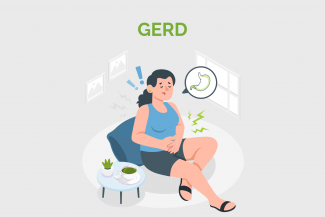
In addition to managing lifestyle described here, treatment options include medication and surgery.
Medication
For chronic reflux and heartburn, the doctor may recommend medications to reduce acid in the stomach. These medicines include H2 blockers, which inhibit acid secretion in the stomach. H2 blockers include: cimetidine (Tagamet), famotidine (Pepcid), nizatidine (Axid), and ranitidine (Zantac).
Another type of drug, the proton pump inhibitor (or acid pump), inhibits an enzyme (a protein in the acid-producing cells of the stomach) necessary for acid secretion. Some proton pump inhibitors include esomeprazole (Nexium), lansoprazole (Prevacid), omeprazole (Prilosec), pantoprazole (Protonix), rabeprazole (Aciphex), dexlansoprazole (Dexilant) and omeprazole/ sodium bicarbonate (Zegerid).
Other approaches to therapy will increase the strength of the lower esophageal sphincter and quicken emptying of stomach contents with motility drugs that act on the upper gastrointestinal (GI) tract. These drugs include bethanechol (Urecholine) and metoclopramide (Reglan).
Surgery
A small number of people with GERD may need surgery because of severe reflux and poor response to medical treatment. However, surgery should not be considered until all other measures have been tried. Fundoplication is a surgical procedure that increases pressure in the lower esophagus. There are also endoscopic procedures that involve making the lower esophageal sphincter function better or the use of electrodes to promote scarring of the lower esophageal sphincter, which helps the loosened sphincter to contract.












